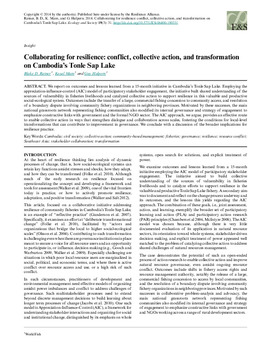Collaborating for resilience: conflict, collective action, and transformation on Cambodia's Tonle Sap Lake

Citation
Ratner, B.D.; Mam, K.; Halpern, G. (2014). Collaborating for resilience: conflict, collective action, and transformation on Cambodia's Tonle Sap Lake. Ecology and Society, 19(3): 31
Tha authors report on outcomes and lessons learned from a 15-month initiative in Cambodia's Tonle Sap Lake. Employing the appreciation-influence-control (AIC) model of participatory stakeholder engagement, the initiative built shared understanding of the sources of vulnerability in fisheries livelihoods and catalyzed collective action to support resilience in this valuable and productive social-ecological system. Outcomes include the transfer of a large, commercial fishing concession to community access, and resolution of a boundary dispute involving community fishery organizations in neighboring provinces. Motivated by these successes, the main national grassroots network representing fishing communities also modified its internal governance and strategy of engagement to emphasize constructive links with government and the formal NGO sector. The AIC approach provides an effective route to enable collective action in ways that strengthen dialogue and collaboration across scales, fostering the conditions for local-level transformations that can contribute to improvement in governance. We conclude with a discussion of the broader implications for resilience practice.
Permalink
Date Available
Type
Publisher
Countries
Research Themes